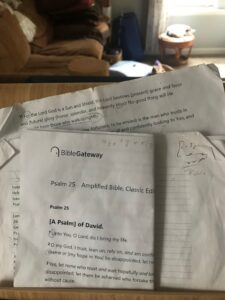Photo by Priscilla Du Pree on Unsplash
Too many Red Sea situations. I turned the ignition off and leaned my head against the headrest, inhaled deeply, then let my head rest against the window, pressing my cheek into the cool smoothness of glass. I would just rest a moment and crack the window to enjoy the smell of the rain. My appointment was not until nine. The tears came then, their path down my cheeks reflecting that of the rain drops sliding down the car’s windows.
“I’m so sorry, Lord! You have been so gracious to teach me how to rely on You during troubles, to keep my mind focused on Scripture, and to choose to be joyful each day but I just can’t this time. There are too many situations that are hopeless.”
I paused.
“Alright. I know better. There are too many situations that seem to be hopeless. I have to wear the bite guard because I grind my teeth at night but the bite guard makes my neck muscles tighten up so much that migraines have returned. The antibiotics for the spider bite that got inflamed make me feel queasy. I can’t swim until the spider bite heals and You know that is the only thing lately that relieves joint stiffness. It’s been weeks since I did any writing, and . . . “
I reflected on the story of God parting the Red Sea so His chosen people could escape Pharoah’s army. (See Exodus 13:17 through Exodus 14:30.) They had been hemmed in on three sides by the mountains and the sea and on the fourth side by the armies of Egypt, a truly impossible situation out of which only God could save them. And God did. He miraculously caused the waters of the Red Sea to stand up like walls so His children could escape their evil pursuers.
You have to stop complaining and doubting — eventually. I shifted in the car seat and glanced at my watch. Five more minutes. I resumed meditating upon the Red Sea story, recalling that as the Egyptian army approached the Israelites were terrified, accused Moses of planning to kill them and sarcastically said they preferred to serve as Egyptian slaves rather than die in the wilderness (Exodus 14:10-12).
Despite that despicable attitude from people who had personally seen His miraculous power, God answered their cry and delivered them. Then the people feared the Lord and trusted Him and Moses.
I also recalled that eventually God expected the people to trust Him and stop their complaining and doubting. When they did not, tragic consequences befell them, time and time and time again. (See Psalm 105, 106, and 107.) Yet, when “they cried to the Lord in their trouble, He delivered them out of their distresses”. (Psalm 107:6, AMPC)
“Oh, help me, Lord! Help me have an attitude pleasing to You! I just can’t seem to do that now!”
Glumly, I walked toward the dentist’s office.
A gray day. . . a gray time. An hour later, I was in the rocker by the window as gray clouds continued darkening the day. I tried to make my heart as still and calm as the silence around me.
“Thank You, Father, that the dentist thought loosening the bite guard would ease the migraines. Open the eyes of my heart now as I finish the morning devotions I had to cut short this morning.”
But as I resumed my reading in Psalms, other troubles floated into consciousness – the ever-present burden for family and friends to be saved, the fatigue that would not abate despite strenuous efforts, the deductibles to be paid this first month of the calendar year, the perennial physical challenges. . .
“Father, these also seem hopeless, just more Red Sea situations! Oh, help me, Lord! I need You!”
I paused then opened my favorite Bible, my Father’s old Amplified Classic, to three passages in Psalms, the words on those pages so underlined, circled and highlighted as to be distracting to anyone who did not have my history with them. Looking at Psalm 28:7, 32:10 and 33:18-22 was like gazing fondly at family pictures.
A PAUSE FOR COMMENTARY. Let’s pause the story and examine one possible interpretation (mine) of these three passages. The Bible text in this section is in quotation marks and in italics (like this). My comments are in in regular print.
[ONE] Psalm 28:7. “The Lord is my Strength and my [impenetrable] Shield;”
When I say the Lord will give me strength and will protect me, it helps me to believe it. And then because of that. . .
“my heart trusts in, relies on, and confidently leans on Him, and I am helped; therefore my heart greatly rejoices, and with my song will I praise Him. “
Because I have tried, the very best I can, to believe His promises, He enables me to trust in, rely on and lean on Him with confidence, which helps me. Then, because of that, my heart leaps for joy and I sing out with praise and gratitude to Him. This is another example of someone with a little faith saying “Lord, I believe! Help my unbelief!” (Mark 9:23-25).
[TWO] Psalm 32:10 “Many are the sorrows of the wicked, but he who trusts in, relies on, and confidently leans on the Lord shall be compassed about with mercy and with loving-kindness.”
When we try with all our heart and soul and strength to trust God with confidence (when we trust, rely, and confidently lean) He covers us completely with His mercy and loving kindness. That means nothing but His mercy and loving kindness touches us.
[THREE] Psalm 33:18-22. “18 Behold, the Lord’s eye is upon those who fear Him [who revere and worship Him with awe], who wait for Him and hope in His mercy and loving-kindness19 To deliver them from death and keep them alive in famine.”
To have your eye on someone is to watch them closely. Notice that the Lord closely watches those who have deep respect for Him, who value Him and cherish Him. In verse 19 (“To deliver them from death and keep them alive in famine”) God reassures believers that He is “ready to deliver them from harm and provide for their needs, even in times of desperation such as death and famine.” Psalms 33 Explained – Verse by Verse Commentary – God’s Blessing
“20 Our inner selves wait [earnestly] for the Lord; He is our Help and our Shield 21 For in Him does our heart rejoice, because we have trusted (relied on and been confident) in His holy name”
These two verses echo the comforting truth of Psalm 28:7 — that we can wait on the Lord with sincere, serious-minded conviction because we know He has helped and protected us in the past. And during those times when we have focused on and been confident in His goodness and mercy, we have been glad.
“22 Let Your mercy and loving-kindness, O Lord, be upon us, in proportion to our waiting and hoping for You.” (AMPC)
Possibly one purpose of verse 22 is to make us ponder how much of what we receive from God depends upon what we do. I have a part to play. If I want to have as much of God’s mercy and loving kindness as it’s possible to have, I must wait and hope for Him earnestly – with all my heart and soul. Casual, half-hearted efforts avail little. James 5:16 says: “The earnest (heartfelt, continued) prayer of a righteous man makes tremendous power available [dynamic in its working]. (AMPC)
I have intentionally prayed these three verses so often that they now come to mind without conscious effort whenever emotions threaten to overwhelm.
Photo by George Berberich on Unsplash
The story continues. . . A red flash drew my eye to the winter-bare tree branches outside the window. A cardinal perched in silhouette, his beak moving as he whistled the high-pitched and clear cheer-cheer-cheer of his species. Flitting from branch to branch, he sang his bright, uplifting two-second song three more times, then zoomed away, agile as a fighter plane.
“Thank You, Father, that birds bring a fresh glimpse of nature’s beauty, even in cities. I know You see that cardinal, and I know You see me, right now, this very minute. You say if we draw near to You, You will draw near to us (James 4:8).
I turned back to my Bible, noting again how all three passages clearly showed that trusting, relying on and leaning confidently on God was the key to experiencing the daily joy God wants us to have. Trusting with confidence also enables me to perceive His mercy, His loving kindnesses and His unfailing provision.
“Thank You, Father, for the unsayable peace to be found in Your Word. Help me keep my mind on Your truths.”
 Another disappointment, Lord??? Then, peace of mind restored, I was up, tidying the two rooms of my condo, making the bed, fluffing couch pillows, folding the crocheted throw, scooping Lily’s mice and crinkle balls into her little brown basket, washing breakfast dishes, wiping the counter, and finally, with sweet anticipation, setting out my grandsons’ coffee and conversation cups. When as preschoolers they began talking over everyone, one day I filled those little white cups with water, placed some Oreos on almost matching plates, poured myself a cup of coffee and practiced taking turns talking, one of many childrearing assists grandparents are privileged to give time-stressed parents.
Another disappointment, Lord??? Then, peace of mind restored, I was up, tidying the two rooms of my condo, making the bed, fluffing couch pillows, folding the crocheted throw, scooping Lily’s mice and crinkle balls into her little brown basket, washing breakfast dishes, wiping the counter, and finally, with sweet anticipation, setting out my grandsons’ coffee and conversation cups. When as preschoolers they began talking over everyone, one day I filled those little white cups with water, placed some Oreos on almost matching plates, poured myself a cup of coffee and practiced taking turns talking, one of many childrearing assists grandparents are privileged to give time-stressed parents.
Then came the sound of a French horn, the ringtone designated for my daughter.
“Sorry, but the boys were invited to David’s house after school today so I’ll pick them up at 7. Can you do pickup tomorrow?”
I stood in silence, then texted: “No problem. I know they will have fun. Love you bunches!” Then a thumbs-up and two hearts.
 I picked up Lily, sat in the rocker, and put her in my lap where, because she was half asleep, she stayed.
I picked up Lily, sat in the rocker, and put her in my lap where, because she was half asleep, she stayed.
“Father, I looked forward to today all week. I see them so seldom now that they are teens. I really needed to see them, today especially.”
I waited, rubbing the velvet of Lily’s ear.
“Well, Lord. You know I have prayed for years that they will have plenty of friends, so this is a good and natural thing. Help me be grateful! And Lord, I really am grateful that I can see them at all, that we live in the same city, and that I’ve been privileged to have a daughter, son-in-law and two grandsons.
Really, Father, thank You. I know that is a privilege . . .’
 “No good thing will He withhold . . .” Back in the kitchen area, I put the cups and saucers back in the cupboard and returned the bunny, bear and airplane to the wobbly ivory bookcase that had held my daughter’s toys.
“No good thing will He withhold . . .” Back in the kitchen area, I put the cups and saucers back in the cupboard and returned the bunny, bear and airplane to the wobbly ivory bookcase that had held my daughter’s toys.
As I filled a mug with water for tea, I glanced at my meditation verses, that bedraggled stack of dog-eared, smudged papers that stayed, with my to-do- list, at the left of my command center, as I liked to think of the generous-sized bar that divides the front room into living room and study area.
One sheet, not squared up with the others, caught my eye. “No good thing will He withhold from them that walk uprightly.” (Psalm 84:11. KJV). I picked up the sheet and reviewed the context.
“You know, Lord. I can see that—to the extent I keep my mind on You–the vicissitudes of daily life strengthen my heart. As I seek, earnestly, to apply Your Word my effort leads me “in paths of righteousness.” My choices to think and do those things that keep me in right standing with You create a path, they guide my steps. It’s like Psalm 94:12-13, isn’t it?
“Blessed (happy, fortunate, to be envied) is the man whom You discipline and instruct, O Lord, and teach out of Your law, That You may give him power to keep himself calm in the days of adversity, until the [inevitable] pit of corruption is dug for the wicked. (Psalm 94:12-13, AMPC, emphasis added.)
“In times when the weight of troubles does overwhelm me, I do keep my mind on You and on Your truths the best I can. You are helping me accept hard things, like the boys growing up and away from me and the pangs and prickles of this aging body.
You know Lord, a few years ago before You led me to serious Bible study and the habit of meditating-to-the-point of memory, just a couple of negative happenings knocked me into the pit. Now, though, I wobble a bit—because I am so very human!–yet Your Word bubbles up in my spirit, like the fountain of life that it is, Your Living Water refreshes my soul, and we move forward, having made spiritual progress upon the very mountains of “troubles, sufferings, and responsibilities” (Habakkuk 3:17-19, AMPC).
Thank You for helping me hide Your Word in my heart. Thank you, Holy Spirit, for the way You teach me personally as I endeavor to diligently study Your Word. Thank You that, though I am not a Biblical scholar, You help me have a scholarly attitude and habit of work that best uses, even amplifies, my personal resources.
And You make the study times and the thinking times with You so warm, so very close.
Truly, Lord, by Your grace, My heart trusts, relies on and confidently leans on You, and I am helped. Truly, my heart greatly rejoices and with my song I do praise You. I honor You, I bow before You in gratitude. . . (Psalm 28:7)





 Photo by Daniel Mirlea on Unsplash
Photo by Daniel Mirlea on Unsplash
 It had been a busy morning already. Having hit snooze twice, morning routines had been shortened: only token wake-up stretches, just a few scritches atop Lily’s head and abbreviated, albeit not abandoned, morning devotions. But I remembered, as ever, to grab the current Bible passage for meditation from its resting place on the kitchen counter. With a final “I love you, Lily Bugs!” I slung my lunch bag and purse over my shoulder and was out the door into the slanting rays of morning sun. At the foot of the stairs, I stopped and glanced at the paper in my hand, as I would all the way to the gym.
It had been a busy morning already. Having hit snooze twice, morning routines had been shortened: only token wake-up stretches, just a few scritches atop Lily’s head and abbreviated, albeit not abandoned, morning devotions. But I remembered, as ever, to grab the current Bible passage for meditation from its resting place on the kitchen counter. With a final “I love you, Lily Bugs!” I slung my lunch bag and purse over my shoulder and was out the door into the slanting rays of morning sun. At the foot of the stairs, I stopped and glanced at the paper in my hand, as I would all the way to the gym. Photo by Wesley Tingey on Unsplash
Photo by Wesley Tingey on Unsplash Photo by Annie Lang on Unsplash
Photo by Annie Lang on Unsplash
 Photo by Cesar Aldhela on Unsplash
Photo by Cesar Aldhela on Unsplash



 Photo by Daiga Ellaby on Unsplash
Photo by Daiga Ellaby on Unsplash


 Photo by Ethel Gr on Unsplash
Photo by Ethel Gr on Unsplash Photo by Mark Olsen on Unsplash
Photo by Mark Olsen on Unsplash Photo by Daniel Morton on Unsplash
Photo by Daniel Morton on Unsplash





